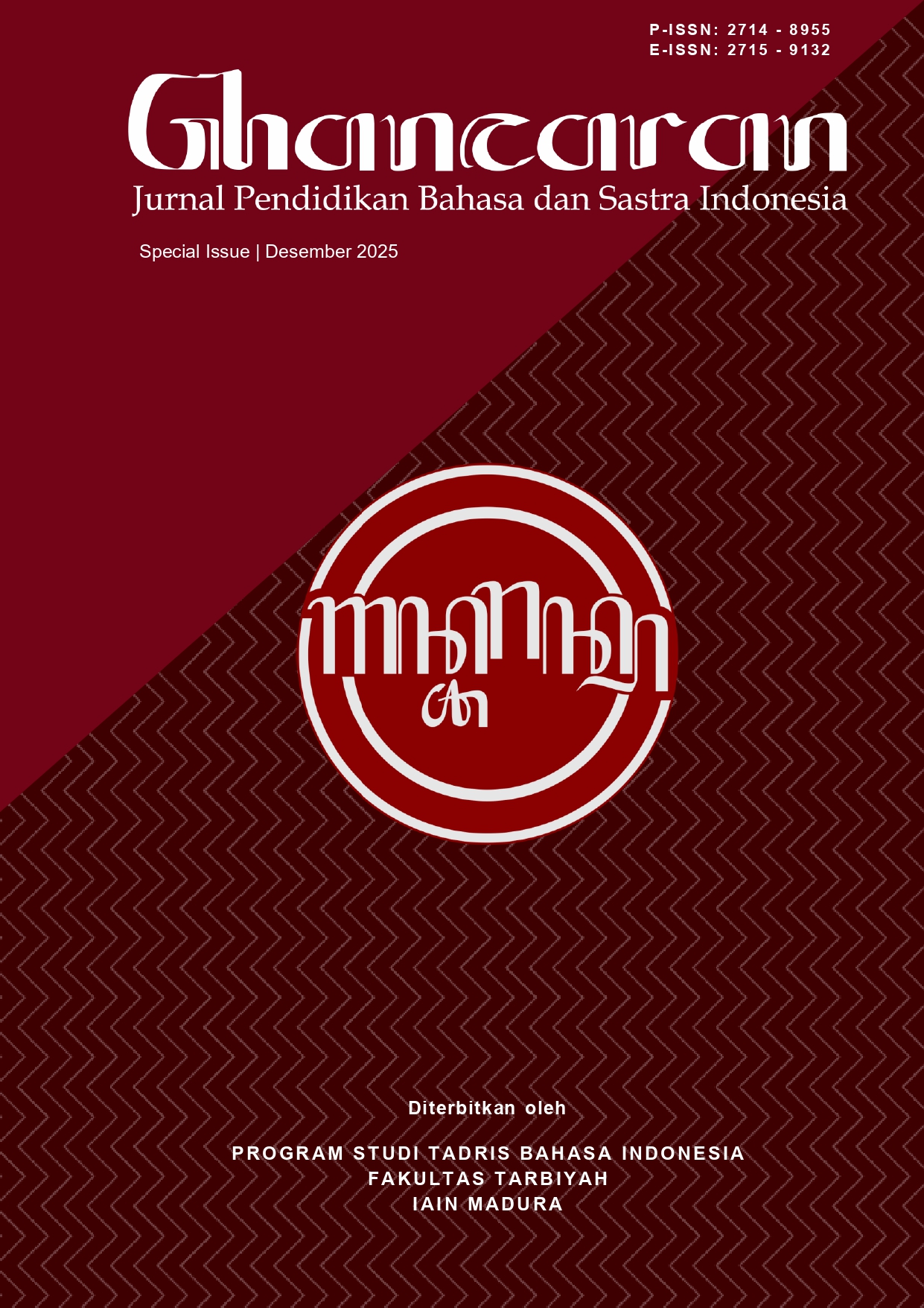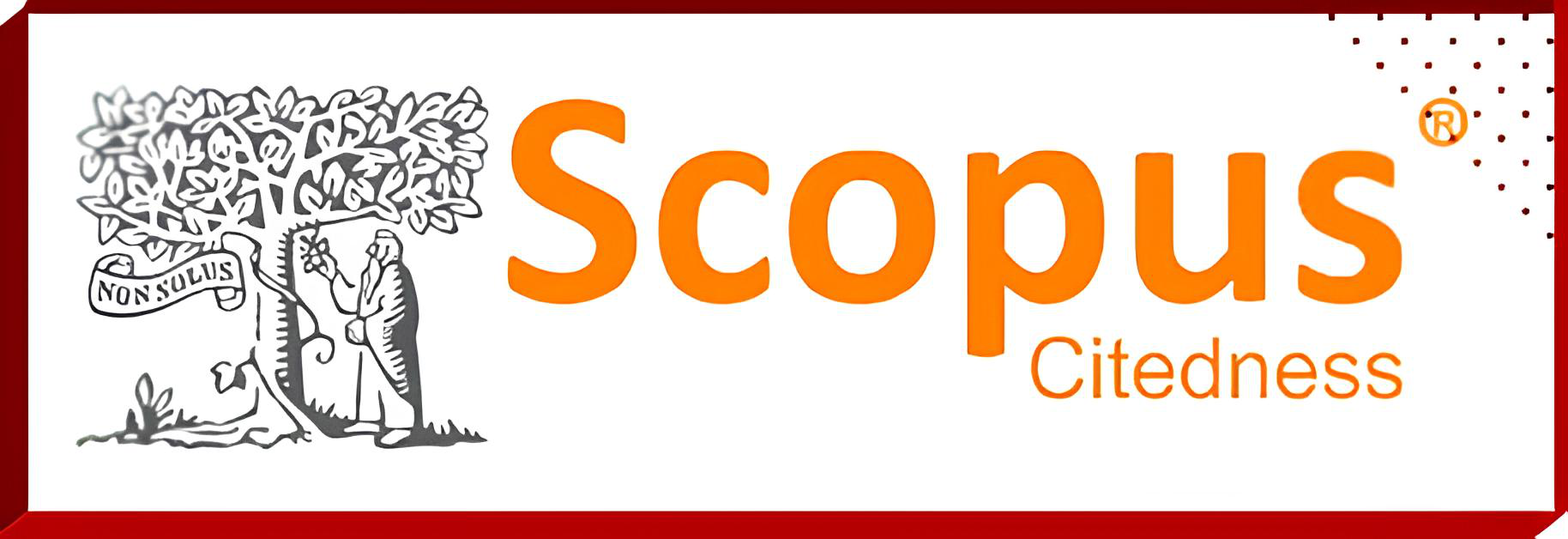Apologizing with Threats? An Ethnocyberpragmatic Study of Social Commerce Content among the Madurese Ethnic Group
 Abstract views: 214
,
Abstract views: 214
,
 PDF downloads: 70
PDF downloads: 70
Abstract
Conventionally, apologies are understood as expressions of regret or corrective exchanges aimed at maintaining social order when a norm is violated. However, in the context of social commerce content among the Madurese ethnic group, apologies do not always signify remorse. This study examines the phenomenon of apologies accompanied by threats in the practice of Madurese social commerce on digital platforms such as Facebook and YouTube. The threats accompanying apologies can be either non-conditional or conditional, and are used to strengthen bargaining positions or assert the speaker’s authority. Using an ethnocyberpragmatic approach, this research highlights how apology utterances accompanied by threats or warnings are employed within Madurese social commerce content. Data were collected from social media posts showcasing bargaining interactions between sellers and buyers. The analysis reveals that apologies in this discourse do not function literally, but rather as part of a culturally distinctive trading strategy. In conclusion, social commerce within the Madurese community serves not only as a medium for economic transactions but also as a site for cultural expression and identity negotiation that remains vibrant in contemporary digital communication practices.
Downloads
References
Alzahrani, A. (2023). Interlanguage Request Modifications: British and Saudi Speakers. Anglia Ruskin Research Online (ARRO).
Blitvich, P. G. (2024). Pragmatics, (Im) Politeness, and Intergroup Communication: A Multilayered, Discursive Analysis of Cancel Culture. Cambridge University Press.
Blum-kulka, S., & Olshtain, E. (1984). Requests and Apologies: A Cross-Cultural Study of Speech Act Realization Patterns (CCSARP). Applied Linguistics, 5(3), 196–213.
Brown, P., & Levinson, S. C. (1987). Politeness: Some Universals in Language Usage (Vol. 4). Cambridge University Press.
Culpeper, J. (2011). Impoliteness: Using Language to Cause Offence. Cambridge University Press.
Dartiningsih, B. E. (2022). Budaya dan Masyarakat Madura. Penerbit Adab.
Drummond, C., McGrath, H., & O’Toole, T. (2023). Beyond the Platform: Social Media as a Multi-Faceted Resource in Value Creation for Entrepreneurial Firms in a Collaborative Network. Journal of Business Research, 158(1), 1–22.
Herzallah, F., & Al-Sharafi, M. A. (2025). Mitigating Seller Uncertainty in Social Commerce Platforms by Exploring Pre-Purchase Customer-Seller Signals. Digital Business, 5(1), 1–15.
Izzati, I. N., Addainuri, M. I., & Fahrurrozi, F. (2024). Aspek Modal Sosial : Peluang dan Tantangan Warung Madura di Kota Tangerang Selatan. Jurnal Ilmiah Manajemen, Ekonomi, & Akuntansi (MEA), 8(3), 1034–1048.
Julijanti, D. M. (2025). Budaya dan Komunikasi Masyarakat Madura. Penerbit Adab.
Jung, Y. (2022). Korean Business Communication: A Comprehensive Introduction. In Korean Business Communication: A Comprehensive Introduction. Routledge.
Lakoff, G. (2001). How Metaphor Structures Dreams. In Dreams (pp. 265–284). Palgrave Macmillan.
Li, X., Jiang, Q., & Wang, K. (2025). Views or likes? Utilizing social paratexts to make recommendations more effective in mobile social E-commerce: Construal level perspective. Journal of Retailing and Consumer Services, 87, 1–15.
Mintowati, Nasrullah, R., & Yuanita, A. (2024). Pragmatik Siber: Pendekatan Interaksi dan Komunikasi di Dunia Digital. PT. Literasi Nusantara Abadi Grup.
Morrow, P. R., & Yamanouchi, K. (2020). Online Apologies to Hotel Guests in English and Japanese. Discourse, Context & Media, 34(1), 1–10.
Muschalik, J. (2018). Threatening in English. In Pragmatics & beyond new series, 0922-842X (Vol. 284). John Benjamins Publishing Company.
Neumaier, T. (2025). Representation of threatening speech in Late Modern English trials. Journal of Pragmatics, 237, 55–67.
Olshtain, E. (1989). Is Second Language Attrition the Reversal of Second Language Acquisition? In Studies in Second Language Acquisition (Vol. 11, Issue 2, pp. 151–165). Cambridge University Press.
Ong, A. K. S., German, J. D., Almario, A. Y. V., Vistan, J. M. V., Galang, J. A. P., Dantis, J. R., & Balboa, E. (2024). Consumer Behavior Analysis and Open Innovation on Actual Purchase from Online Live Selling: A case study in the Philippines. Journal of Open Innovation: Technology, Market, and Complexity, 10(2), 1–12.
Putikadyanto, A. P. A., Mulyono, & Mintowati. (2024). An Ethnopragmatic Study in Classroom Learning: How Do Liberal and Conservative Teachers Use Directive Speech Strategies? Ganesha: Journal of Applied Linguistics, 1(3), 186–200.
Putikadyanto, A. P. A., Soepardjo, D., Mulyono, M., & Savitri, A. D. (2025). Strategi Permintaan Maaf dalam Interaksi Jual Beli Etnis Madura: Kajian Etnocyberpragmatik. Entita: Jurnal Pendidikan Ilmu Pengetahuan Sosial Dan Ilmu-Ilmu Sosial, 989–1006.
Salgueiro, A. B. (2010). Promises, Threats, and the Foundations of Speech Act Theory. Pragmatics, 20(2), 213–228.
Spencer-Oatey, H. (2008). Culturally Speaking Second Edition: Culture, Communication and Politeness Theory. Bloomsbury Publishing.
Syamsuddin, H. M. (2019). History of Madura: Sejarah, Budaya, dan Ajaran Luhur Masyarakat Madura. Araska Publisher.
Tedjakusuma, A. P., Silalahi, A. D. K., Eunike, I. J., Phuong, D. T. T., & Riantama, D. (2025). The Trust-Driven Path to Consumer Engagement Behaviors: Exploring the Role of Streamer and Platform Characteristics in Live-streaming E-commerce. Digital Business, 5(1), 1–15.
Vassilieva, J. (2016). Narrative Psychology: Identity, Transformation and Ethics. Springer.
Yu, D., Su, H., & Bondi, M. (2024). Developing Local Grammars of Speech Acts in Italian: The Case of Apology. Lingua, 299(1), 1–20.
Copyright (c) 2025 GHANCARAN: Jurnal Pendidikan Bahasa dan Sastra Indonesia

This work is licensed under a Creative Commons Attribution-ShareAlike 4.0 International License.
Ghancaran: Jurnal Pendidikan Bahasa dan Sastra Indonesia uses an Open Access Policy under the Creative Commons Attribution-ShareAlike 4.0 International License. Authors publishing in this journal agree to the following terms:
- Ghancaran Journal holds the copyright and grants the journal rights for first publication with the work simultaneously licensed under a

The work is distributed under Creative Commons Attribution-ShareAlike 4.0 International License which allows others to share, copy, and redistribute the material in any media or format and adapt, remix, change, and develop the material even for commercial purposes, as long as it is stated credit and license derivative works under similar terms. - Authors may make additional contractual arrangements for non-exclusive distribution of the journal's published work version.
- Authors are permitted to post their work online (e.g., in institutional repositories or on their websites) before and during submission, as doing so may lead to productive exchange.



















